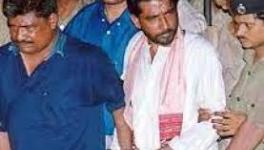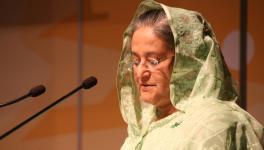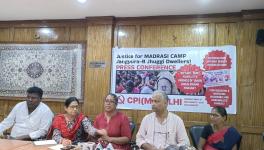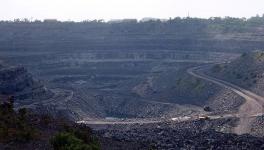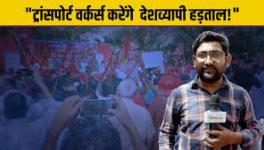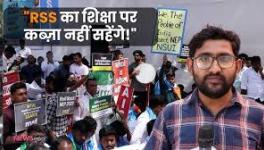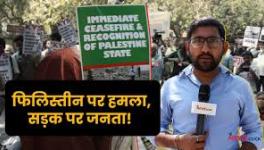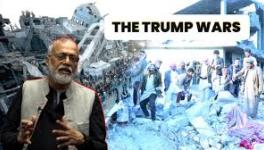Rafale Deal: The Big Difference With Bofors is Nobody Has Found Money Trail Yet: N Ram
A series of investigative articles published recently in The Hindu has flared up the political storm over the controversial Rafale aircraft deal. The Hindu reports claim that the Prime Minister’s Office (PMO) was conducting ‘parallel negotiations’ in the deal, removing the anti-corruption clauses and the integrity pact, while France refused to offer any bank guarantee for the 36 Rafale jets India bought, which shot the price of each aircraft by 41% Edited excerpts of an interview with senior journalist N Ram, the author of the reports:
Do you think the Rafale scandal will be Narendra Modi’s nemesis?
N. Ram: It was something very mysterious to start with. It was announced suddenly and I think all procedures were violated or bypassed. It also came as a surprise to all his senior officials. The nature of decision-making was quite shocking. Nothing had prepared people for that, especially on a major defence deal because in the past, following the Bofors scandal, governments had been fairly careful in signing defence deals or military deals on this scale anyway. So, it came as a big shock when a completely new framework for a deal to buy state of the art fighter aircraft was announced.
And then there was a stench of corruption here because the price was too high, the air force didn’t get what it asked for, the usual procedures were not followed or violated and it looked like a big loss for the Indian national exchequer. It took some time for some of the details to emerge clearly since the contract was signed in September 2016. But it is about completely manipulating the decision-making process to do something that is seen to be against the public interest, and also in favour of certain business groups and so on. There was no transparency.
The present government removed Hindustan Aeronautics Limited (HAL) and bought a lot less aircraft. Why? What did your research show?
Research shows that it was arbitrary decision-making. It makes no commercial or financial sense, nor any sense for the air force. Because they wanted seven squadrons, now they are going to get two. And part of the plan was to develop indigenous capabilities using a well-known public sector company, HAL. However, that has been thrown out of the window now, saying that it was taking too long. Of course, it’s taken too long but you also contributed to that.
Also Read: MoD Had Protested Against PMO Undermining Rafale Negotiations, Says Report
They could have considered I think the Eurofighter offer, either go for it or use it as a leverage to beat the French down on these issues. But because of the arbitrary nature of the decision-making, parallel negotiation was conducted by the PMO and by the National Security Advisor behind the backs of the officially sanctioned negotiators. In case of the seven-member Indian negotiating team constituted by law in the Defence Ministry, their position is undercut on virtually every issue—from price, bank guarantees, sovereign guarantee to delivery schedules. This is because the parallel negotiators are with the French side rather than the Indian side.
HAL got kicked out. So, who was brought in?
Nobody was brought in, but the interest is in the offsets. Initially, it looked like some of the offset partners will do what HAL was going to do, but it’s not very clear. Some of them will be manufacturing executive business jets rather than anything in the military sphere. I don’t know what the connection is, because you were supposed to strengthen indigenous defence capability, not provide handouts to others who may be in trouble.
Businessman Anil Ambani became involved in the deal. How did that work?
He went to Paris and boasted about the deal being very big. It was even reported in the press. It is not yet clear what the size of investment with Anil Ambani’s joint venture will be. But I think they have said that he will put out an executive jet, whether it has anything to do with defence that we don’t know.
Could you please elaborate on the extent of corruption?
For example, the procedure laid down has to have anti-corruption clauses. There should not be any commission agents or undue influence- it’s called the integrity pact. And the buyer, the Government of India, will have access to the book of accounts of the commercial suppliers—Dassault and MBDA France in this case—their books of accounts would be open to scrutiny, to check in case they give a bribe or a commission. The French side, however, absolutely refused this under the pretext that it’s an inter-governmental agreement.
Also Read: Govt. Waived Anti-corruption Clauses in Rafale Deal, Says Report
Actually, it’s not an inter-governmental agreement if these supply protocols are to be executed by the commercial private companies. Have they paid commissions? Or are they going to pay commissions? Have they used undue influence? What are they hiding in the book of accounts? These questions arise, which lead to suspicion of corruption.
Why would the government want to waive anti-corruption clauses? To hide something?
That’s the question we have asked. This is a safeguard that is required in your procedure, then why would you waive it? The negotiators demanded it. The Ministry of Law and Justice had wanted the safety procedures in place, but the PMO’s parallel track shot it down. If you read the report, on every issue similar to this, the French side said it already agreed with them, so that matter is over. Even if only to use it as a bargain, you could have considered the Eurofighter deal, to make the French be more reasonable.
If we listen to Modi now after the Pulwama attack, he blames the Congress government for delaying the Rafale deal. He turned the whole story upside down. How do you see it?
It will be a major issue, and now, of course, they will try to control the narrative, on the platform of hyper-nationalism, jingoism, war mongering, not actually going to war, but talking in a war like manner. Because you can’t go to war with two nuclear states are involved, everybody knows that, but they are using this, but Rafale won’t go away. Modi is saying they delayed it… it’s true, it was delayed, but part of the delay is during his period, because they came into power in 2014, and they got have easily push forward on these issues, making Make in India an important part of it. If the French didn’t agree you could have gone to Eurofighter, which the Air Force says is equally good.
Also Read: Rafale Deal: Is the Inter-Governmental Agreement a Smokescreen?
They both meet Air Force qualifications, the only difference is price and delivery schedules and so on, how quickly you can get it. They hide behind these procedures to say that we can’t consider the Eurofighter option, saying these procedures are already there to prevent us. So, on the one hand you go via procedures to scuttle the Eurofighter offer or looking at the Eurofighter offer or even using it to compare prices and on the other hand, you completely do away with the procedure in striking the new Rafale deal with 36 aircraft. So, I think this is certainly misconduct on a massive scale. It will be a big issue, I think.
Will it be decisive for the elections?
No issue is decisive, I believe that the really decisive issues are livelihood issues. And if you see the public opinion polls, now and earlier, once usually the top will be unemployment, other livelihood issues are price rise, and the rural distress in a country like India, the agrarian distress, those are the top issues. Even now they will be the top issues followed by whether this hyper nationalism or Rafale, we can’t say it. But livelihood issues matter most in any election in India.
How is the Rafale deal different from Bofors?
The commonality is in decision-making. In the Bofors deal and also in Rafale deal, professional standards were not applied to make the decision. In Bofors, for example, the rival to Bofors, the French Howitzer, came first and all the military trials, but through political intervention, Bofors was preferred. And then you found that, it involved commission payments, bribes, disguised as commission, percentage payments, so everything… something was supplied as part of the contract, the money went to secret Swiss bank accounts to these people and they were of course initially hidden, we found out who they were.
In Rafale, the money trail has not been found yet. But decision-making is common, but as I said the anti-corruption clauses, the integrity pact all this were done away with, making it easier to cover up corruption if it’s happened and so on. That’s the huge difference. The big difference is nobody has found the money trail yet. Same thing about 2G spectrum by the way, they alleged it’s a huge scam. A. Raja, the then telecom minister said that there is no money trail, he said it in many interviews, including what The Hindu published, and that’s exactly what the trial court found. They found no evidence of any money being paid as a result. So, the decisions you can question, but there was no bribe that could be proved by the CBI at that stage, so very similar.
The government seems to be going against The Hindu for publishing the documents. Do you think investigative journalism is getting riskier in India?
Of course, that’s at stake. I think the Official Secrets Act is an obnoxious piece of legislation. It goes back to 1923, its part of the British Raj, used it to against the people of India, against the freedom struggle at that point. Unfortunately, it continues to be in the statured books. It has been rarely used against publications. Those who publish any number of secret documents have not been punished in the past. In 1981, I was Washington correspondent with The Hindu, and we published many secret papers, where India was involved in negotiations with International Monetary Fund for what was then the largest multi-lateral loan of credit in line of credit in history, 5 Billion SDR, about $ 6.3 billion at that time. And lots of secret papers were there. Nobody spoke about using the Official Secrets Act against it.
Also Read: ‘Stolen Documents’: Opposition Questions Government’s Ability to Defend Country
On Bofors, we published 250 documents, including many government documents, nobody spoke about using the Official Secrets Act of 1923 against the publications. The public-spirited lawyer Prashant Bhushan has produced the secret papers and documents and taken them to the court. For example, on the coal block allocations scandal, the courts have no hesitation in looking at it. Nobody thought of using the Official Secrets Act against Prashant Bhushan. So, the first time it happened was in the Supreme Court, but it remains to be seen. It has been clarified that it won’t, I think, according to the report in Times of India and also in Editor’s Guild statement, that it won’t be used against the journalists and lawyers. Let’s wait and see. But we are not concerned about it. Because we are well protected by Article 19(1)(a) of the Indian Constitution. The fundamental right to freedom of speech and expression and also by the RTI provisions specifically Section 8(1i) and 8(2) which overtake the Official Secrets Act, so we are not really concerned about it.
Aaquib Khan is a Mumbai-based multi-media journalist. He tweets at @kaqibb.
Get the latest reports & analysis with people's perspective on Protests, movements & deep analytical videos, discussions of the current affairs in your Telegram app. Subscribe to NewsClick's Telegram channel & get Real-Time updates on stories, as they get published on our website.













